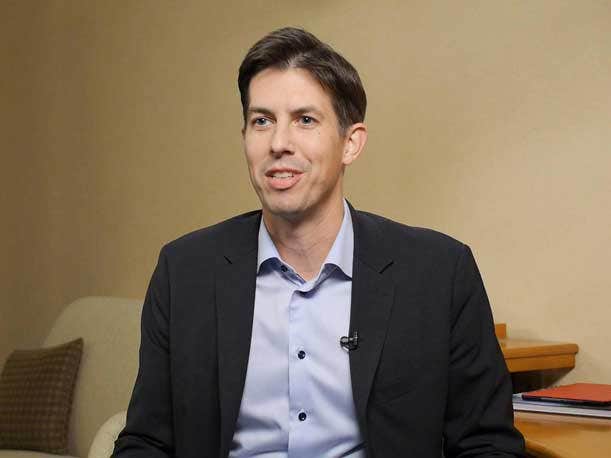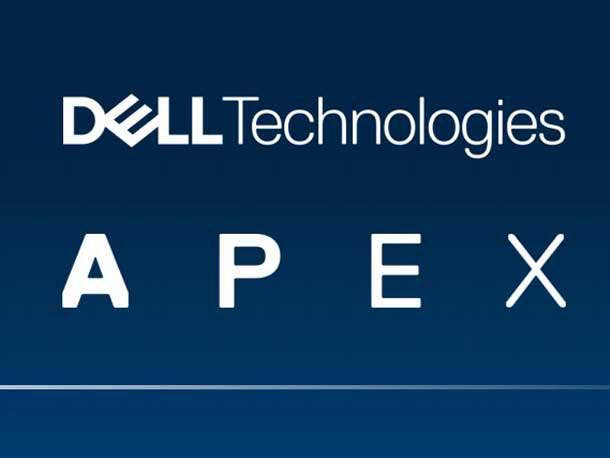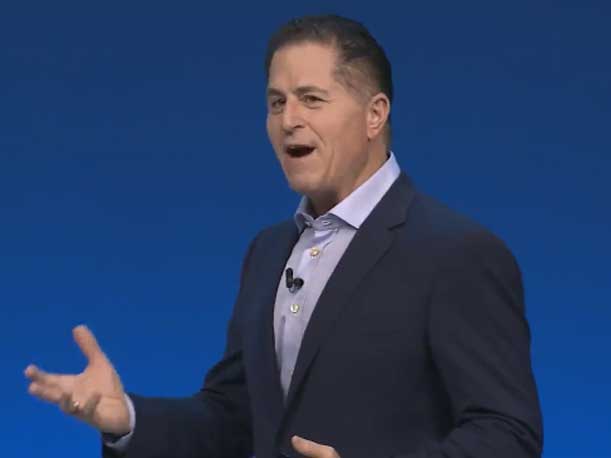Dell Co-COO Chuck Whitten’s Sudden Exit: 5 Big Things To Know
The sudden departure of Dell Technologies Co-COO Chuck Whitten comes as the tech giant endures an industrywide PC sales slump and announced 6,650 layoffs earlier this year but holds No. 1 positions in several categories, including x86 servers and PC workstations.

On his first earnings call as a Dell employee, Anthony Charles “Chuck” Whitten was invited to the microphone by Jeff Clarke, who at the time had just added “co” to his longtime title of COO, which he now shared with the man he was introducing.
“He and I have worked together for many years alongside the rest of the leadership team to help shape Dell’s strategy and growth initiatives,” Clarke said on the August 2021 call. “Welcome, Chuck.”
Whitten then told investors the company was well positioned for its next phase of growth.
“We have never been more optimistic about our ability to innovate, delight customers, deliver growth and create value for all shareholders in the coming years,” he said on the 2021 call.
As he leaves two years later, the company’s growth has slowed. Amid the nascent generative AI boom, Dell is mired in an industrywide period of slumping PC sales—without VMware’s high-margin software or enough infrastructure sales to soften the blow.
[RELATED: Dell Technologies Co-COO Chuck Whitten Will Resign]
Partners who spoke with CRN and asked not to be named said they believe Whitten’s departure, which was announced July 28, shows the toll the economy has taken on the company, which rode the pandemic’s wave of technology refresh to record heights of sales only to see revenue growth stagnate. In February, Dell announced plans to cut 6,650 jobs. In March, Dell’s annual revenue hit another record, but it grew 1 percent this time versus 17 percent growth the year before.
That said, as of June 8—the first quarter of its 2024 fiscal year—Dell has been No. 1 in research firm IDC’s tracking among x86 server sales for six consecutive years, holding a dominant position in units moved for the past 25 quarters. In addition, Dell was No. 1 in external enterprise storage with a 31.5 percent revenue share over rivals, and in storage software with 11.2 percent of the revenue. It holds the top place in hyperconverged and converged systems and in purpose-built backup appliances. It is also first in PC workstations with 46.5 percent of that market and in PC monitors with 19 percent of the market.
“As we enter a new economy, it’s not surprising that they’re shifting away from having a co-COO,” one Dell partner told CRN. “Clarke has long been seen as the lead COO so it ultimately comes down to efficiency with how your leadership teams are acting and compensated. Redundant COOs seemed unnecessary.”
Another Dell partner called it predictable, since Clarke—a near-legendary figure in IT—does not seem to need help leading.
“It is difficult for partners to speculate on the strategic reasons behind executive changes at large companies such as Dell,” the partner said. “Dell has a very strong leadership team, and it is not surprising that Jeff will continue in the role given his stature in the company.”
Whitten is not the only member of the C-suite departing. The company’s longtime CFO, Tom Sweet, announced he is retiring this month. He is being replaced by Dell’s comptroller, Yvonne McGill.

The June Strategy
A Rice University graduate with a Harvard University MBA, Whitten spent 22 years at consulting firm Bain & Company. He rose to lead the Southwest division, working as the consultant’s top adviser to Dell for more than a decade. Whitten was named Dell’s co-COO in a June 2021 press release.
“Chuck joins the company at a pivotal time to give us greater leadership capacity to cover more ground, assess more opportunities and speed decision-making to best serve customers,” his fellow COO Clarke said in a statement at the time. “As our top adviser, Chuck has been an integral part of the team for a long time working across strategy, transformation and operations.”
On the August earnings call that introduced him to investors, Whitten said after spending years as a coach he was eager to hit the field.
“I’ve worked for more than a decade with Michael, Jeff and the rest of Dell leadership on the company’s strategy and positioning,” Whitten said on the earnings call. “The company has tremendous opportunity ahead, and we’re focused on executing the strategy laid out in the June investor presentation.”
Among the goals: innovate beyond the hardware, profitably win in the consolidation of Dell’s core markets, maintain a best and first partner status with VMware, and drive Apex as-a-service offerings that simplify digital transformation.
“Together Jeff, Chuck and I will shape the future of the company and accelerate the outcomes we can drive for customers,” Dell Chairman and CEO Michael Dell said in the June statement that introduced Whitten. “Chuck’s leadership, energy, knowledge and humanity make him the obvious choice to join our team and strengthen our industry leadership.”

Dell Apex Hits $1 Billion ARR
Whitten raised eyebrows with rival Hewlett Packard Enterprise when he told investors that Dell had broken $1 billion in annual recurring revenue with Dell Apex.
“Our Apex ARR is now over $1 billion, and we grew orders 78 percent year on year in Q2 while adding almost 200 new customers,” he said during Dell’s second-quarter Fiscal Year 2023 call. “Customers like Federal Home Loan Bank in San Francisco, who is using Apex private cloud to support its growth and cloud strategy and realizing significant cost savings as the financial institution serves its members, and customers like Montage Health, who’s using Apex private cloud to provide clinicians better access to critical applications and information for patient care and staff collaboration.”
HPE President and CEO Antonio Neri questioned the figures. When asked about the numbers and the subsequent HPE chatter in an interview with CRN, Whitten said Apex is meeting a customer need and giving Dell a chance to expand its market with cloud offerings. That was one of the strategies outlined in the June 2021 investor call.
“Customers want a simple and consistent cloud experience across multi-cloud, multi-edge and multi-data center environments, and they want choice in how they consume that infrastructure,” Whitten told CRN. “It’s giving customers the choice to bring a modern and consistent cloud experience across all of their estate. We’re having success because it’s a tremendous product. It’s a tremendous solution at the right time for customers right now and that’s what underpins our billion dollars, our 78 percent year-over-year growth in Q2 and importantly 200 new customers that joined Dell because of Apex.”
For the two years he has spent with the company on the inside, Whitten has been driving the value of Dell Apex to partners and customers.
During Dell Technologies World in May he walked the audience through the largest expansion in services yet to the platform, including integrations with VMware, Red Hat, Microsoft Azure and Amazon Web Services.
“We are now the world’s most comprehensive as-a-service and multi-cloud portfolio that spans from the data center to the public cloud and now to client devices,” he told the crowd.
He later drove home the ease of consuming Apex and the modality of its services in a Q&A following the presentation.
“Would you like to buy your infrastructure? Would you like to subscribe to your infrastructure? Would you like to subscribe to your infrastructure with layers of managed services either through us or through a partner? And would you like all of that in a modern cloud experience?” he said.
He was asked again about Apex revenue numbers on the company’s most recent earnings call in June. He said there would be no update until Dell had meaningful information to share.

Dell COO Jeff Clarke
‘Redundant COOs Seemed Unnecessary’
While one of Dell’s top global channel partners said Whitten’s departure shakes up the succession plan they had believed was in place, two more said they were not surprised given the unusual leadership arrangement.
“It surprised me since he was obviously being groomed to replace Michael as exit strategy for him,” said the top executive from the global Dell partner.
The executive said Whitten was thought to have been hired to potentially replace Dell’s longtime CEO and founder Michael Dell. However, that plan evaporated after just two years.
“I imagine since he’s been co-COO with Jeff Clarke that, if they were downsizing at the top, he was the one to go. It’s super interesting since he has been on point and in the limelight for the past couple of years at key events,” said the executive.
Another Dell partner said they are confused by the move to part with Whitten.
“It is difficult for partners to speculate on the strategic reasons behind executive changes at large companies such as Dell,” one said. “Dell has a very strong leadership team, and it is not surprising that Jeff will continue in the role given his stature in the company. We do not expect this organizational change will have any impact on our day-to-day partnership activity with Dell.”
One other partner saw him as the victim of an unpredictable economy.
“It’s not surprising that they’re shifting away from having a co-COO,” the partner said. “Clarke has long been seen as the lead COO so it ultimately comes down to efficiency with how your leadership teams are acting and compensated. Redundant COOs seemed unnecessary.”

A $19 Million Good-Bye
Dell gave Whitten a cash sign-on bonus of $5 million when he joined in 2021, according to filings.
Dell also awarded Whitten a $45 million “new hire equity award” in the form of time-based RSUs with a five-year vesting period. The rub was that, according to the filing, “98 percent of Mr. Whitten’s pay is at-risk, time-based and performance-based pay.”
When Whitten joined Dell in August 2021, the company’s shares traded at $49.04. While Dell shares have dipped to as low as $32.05 over the last year, the price has rebounded and closed Tuesday at $53.37.
As part of Dell’s separation agreement, Whitten is allowed to keep 354,000 shares of Dell’s common stock, which will continue to vest until August 2025. As of Tuesday’s trading those shares are worth $18.9 million.

Dell CEO Michael Dell
‘The Future Is Bright’
On July 28, Whitten posted to his LinkedIn account that although he was stepping away, “the future is bright” adding that he will “forever be cheering on Dell Technologies.”
“It has been a privilege working alongside and learning from Michael Dell and Jeff Clarke the last 14 years, and the company has never been better positioned for the current moment in technology. I will forever be cheering on Dell Technologies—the future is bright!”
In a statement that same day, Michael Dell thanked Whitten for his many contributions over 14 years as part of the “extended Dell team.”
“We’ve accomplished a lot together and I know great things are to come for Chuck and for Dell Technologies,” Dell wrote.